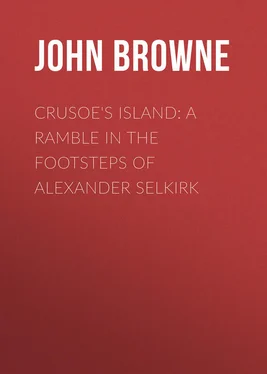John Browne - Crusoe's Island - A Ramble in the Footsteps of Alexander Selkirk
Здесь есть возможность читать онлайн «John Browne - Crusoe's Island - A Ramble in the Footsteps of Alexander Selkirk» — ознакомительный отрывок электронной книги совершенно бесплатно, а после прочтения отрывка купить полную версию. В некоторых случаях можно слушать аудио, скачать через торрент в формате fb2 и присутствует краткое содержание. Издательство: Иностранный паблик, Жанр: foreign_antique, foreign_prose, на английском языке. Описание произведения, (предисловие) а так же отзывы посетителей доступны на портале библиотеки ЛибКат.
- Название:Crusoe's Island: A Ramble in the Footsteps of Alexander Selkirk
- Автор:
- Издательство:Иностранный паблик
- Жанр:
- Год:неизвестен
- ISBN:нет данных
- Рейтинг книги:3 / 5. Голосов: 1
-
Избранное:Добавить в избранное
- Отзывы:
-
Ваша оценка:
- 60
- 1
- 2
- 3
- 4
- 5
Crusoe's Island: A Ramble in the Footsteps of Alexander Selkirk: краткое содержание, описание и аннотация
Предлагаем к чтению аннотацию, описание, краткое содержание или предисловие (зависит от того, что написал сам автор книги «Crusoe's Island: A Ramble in the Footsteps of Alexander Selkirk»). Если вы не нашли необходимую информацию о книге — напишите в комментариях, мы постараемся отыскать её.
Crusoe's Island: A Ramble in the Footsteps of Alexander Selkirk — читать онлайн ознакомительный отрывок
Ниже представлен текст книги, разбитый по страницам. Система сохранения места последней прочитанной страницы, позволяет с удобством читать онлайн бесплатно книгу «Crusoe's Island: A Ramble in the Footsteps of Alexander Selkirk», без необходимости каждый раз заново искать на чём Вы остановились. Поставьте закладку, и сможете в любой момент перейти на страницу, на которой закончили чтение.
Интервал:
Закладка:
John Ross Browne
Crusoe's Island: A Ramble in the Footsteps of Alexander Selkirk / With Sketches of Adventure in California and Washoe
CRUSOE'S ISLAND
CHAPTER I.
THE BOAT ADVENTURE
My narrative dates as far back as the early part of the year 1849. Then the ship Anteus was a noted vessel. Many were the strange stories told of strife and discord between the captain and the passengers; pamphlets were published giving different versions of the facts, and some very curious questions of law were involved in the charges made by both parties. It appeared from the statement of the passengers, who were for the most part intelligent and respectable Americans, that, on the voyage of the Anteus to California, their treatment by the captain was cruel and oppressive in the extreme; that, before they were three weeks from port, he had reduced them almost to a state of absolute starvation; and, in consequence of the violence of his conduct, which, as they alleged, was without cause or provocation on their part, they considered their lives endangered, and resolved upon making an appeal for his removal at the port of Rio. On the arrival of the vessel at Rio the captain was arraigned before the American consul, and pronounced to be insane by the evidence of six physicians and by the testimony of a large majority of the passengers. It was charged, on the other hand, that the passengers were disorderly, mutinous, and ungovernable; that they had entered into a conspiracy against the captain, and in testifying to his insanity were guilty of perjury. The examination of the case occupied several weeks before the American consul; voluminous testimony was taken on both sides; the question was submitted to the American minister, to the British consul, and to the principal merchants of Rio, all of whom concurred in the opinion that, under the circumstances, there was but one proper course to pursue, which was, to remove the captain from the command of the vessel. He was accordingly deposed by the American consul, and a new captain placed in the command. This was regarded by the principal merchants of New York as an arbitrary exercise of authority, unwarranted by law or precedent, and a memorial was addressed by them to the President of the United States for the removal of the consul. A new administration had just come into power; and the consul was removed, ostensibly on the ground of the complaints made against him; but, inasmuch as some few other officers of the government were removed at the same time without such ground, it may be inferred that a difference in political opinion had some weight with the administration.
It is not my intention now to go into any argument in regard to the merits of this case; the time may come when justice will be done to the injured, and it remains for higher authority than myself to mete it out. I have simply to acknowledge, with a share of the odium resting upon me, that I was one of the rebellious passengers in the Anteus. My companions in trouble so far honored me with their confidence as to give me charge of the case. I was unlearned in law, yet possessed some experience in sea-life; and believing that the lives of all on board depended upon getting rid of a desperate and insane captain, aided to the best of my ability in having a new officer placed in the command. To the change thus made, unforeseen in its results, I owe my eventful visit to the island of Juan Fernandez.
It was the intention of our first captain to touch at Valparaiso for a supply of fresh provisions. In the ship's papers this was the only port designated on the Pacific side except San Francisco. Our new commander, Captain Brooks, assumed the responsibility of leaving the choice between Valparaiso and another port to the passengers. It was put to the vote, and decided that we should proceed to Callao, so that we might pass in sight of Juan Fernandez, and have an opportunity of visiting Lima, "the City of the Kings."
Early on the morning of the 19th of May, 1849, we made the highest peak of Massa Tierra, bearing N.N.W., distant seventy miles. The weather was mild and clear. As the sun rose, it fell calm, and the ship lay nearly motionless. A light blue spot, scarce bigger than a hand-spike, was all that appeared in the horizon. It might have passed for a cloud but for the distinctness of its outline. Weary of the gales we had encountered off Cape Horn, it was a pleasant thing to see a spot of earth once more, and there was not a soul on board but felt a desire to go ashore. For some days past, myself and a few others had talked secretly among ourselves about making the attempt in case we went close enough; but now there seemed to be every prospect of a long calm, and we took it for granted the captain would clap on all sail if we took the trades. There was no other chance but to lower one of the boats and row seventy miles. A party of us agreed to do this, provided we could get a boat. The ship's boats we knew it would be impossible to get without permission of the captain, and that we were not willing to ask. Mr. Brigham, a fellow-passenger, was owner of one of the quarter-boats. We broached the matter to him, and he gladly joined in the adventure, together with his partner and some friends, so that we made in all a very pleasant party of eleven. The proper number of men for the boat was six, but in consideration of the great distance and the necessity of a change at the oars, five more were crowded in. We had been in the habit of rowing about the vessel whenever it was calm, and this we thought would be a good excuse for lowering the boat. Being in great haste, lest the captain should object to letting us go, we only thought of a few necessary articles in case we should be cast away or driven off from the island. Two small demijohns of water, a few biscuits, a piece of dried beef, and some cheese and crackers comprised our entire stock of provisions; and for nautical instruments we had only a lantern and a small pocket compass. Not knowing but there might be outlaws or savages ashore who might undertake to murder us, we armed ourselves with a double-barreled gun, a fusee, and an old harpoon, which was all we could smuggle into the boat in the excitement of starting. Captain Brooks happening to come on deck, perceived that there was something unusual going on, and, suspecting our design, took occasion to warn us of the folly of such an expedition. At the same time, thinking there was more bravado than reality about it, he laughed good-humoredly when we acknowledged that we were going ashore. "Be sure," said he, as we went over the side, "not to forget the peaches. You will find plenty of them up in the valleys. Only don't lose sight of the vessel. You may exercise yourselves as much as you please, but keep the royals above water, whatever you do. Bear in mind that you are more than seventy miles from that peak!" We promised him that we would take care of ourselves, and come back safe in case we were not foundered.
At 9 A.M. we bade our friends good-by, and with three cheers pushed off from the ship. The boat was only twenty-two feet long and an eighth of an inch thick: it was made of sheet-iron, and was very narrow and crank. Most of us, except myself and a whaleman named Paxton, were unused to rowing, so that the prospect of reaching land depended a good deal upon the day remaining calm, and upon keeping the boat trimmed, the gunwales being only ten inches out of the water.
There was no excuse for this risk of life, save that insatiable thirst for novelty which all experience to some extent after the monotony of a long voyage. I will only say, in regard to myself, that I was too full of joy at the idea of a ramble in the footsteps of Robinson Crusoe to think of risk at all. If there was danger, it merely served to give zest to the adventure.
Читать дальшеИнтервал:
Закладка:
Похожие книги на «Crusoe's Island: A Ramble in the Footsteps of Alexander Selkirk»
Представляем Вашему вниманию похожие книги на «Crusoe's Island: A Ramble in the Footsteps of Alexander Selkirk» списком для выбора. Мы отобрали схожую по названию и смыслу литературу в надежде предоставить читателям больше вариантов отыскать новые, интересные, ещё непрочитанные произведения.
Обсуждение, отзывы о книге «Crusoe's Island: A Ramble in the Footsteps of Alexander Selkirk» и просто собственные мнения читателей. Оставьте ваши комментарии, напишите, что Вы думаете о произведении, его смысле или главных героях. Укажите что конкретно понравилось, а что нет, и почему Вы так считаете.












